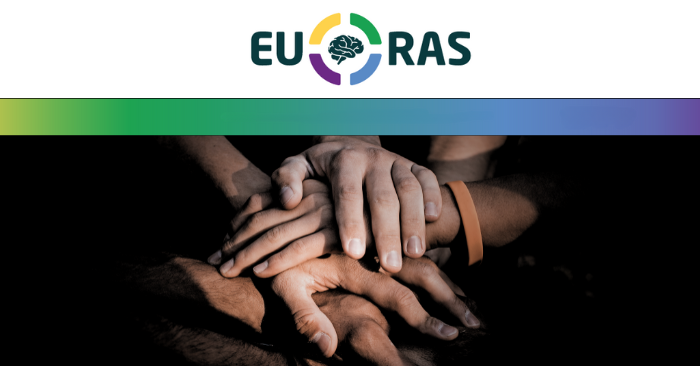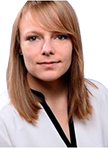
EURAS

Description
- Programme: Horizon Europe
- EU funding amount: around 8 million euros, of which around 1 million euros for Bavaria
- Duration: 06/2023-05/2027
- Coordinator: Prof. Dr. sc. nat. Anna Fejtová, Universitätsklinikum Erlangen
- Website: www.euras-project.eu
EU project EURAS: Patient research partnerhsip - towards new treatments for neurodevelopmental RASopathies
In the battle to help their children suffering from RASopathies, parents from the Syngap Elternhilfe association initiated a network that is now active across Europe and funded by the European Union: EURAS. Coordinated by Universitätsklinikum Erlangen, EURAS links the perspective of those affected with that of those involved in research. Their aim is to understand the diseases better and find new, effective treatments for them.
RASopathies are a group of genetic diseases triggered by increased activation of the cellular RAS-MAPK signal pathway. This signal pathway has a decisive influence on growth and the differentiation of our cells. A defect can lead to defects in organs, growth disorders and an increased risk of cancer. RASopathies may entail physical features such as heart defects or skin changes. Current treatments may sometimes alleviate symptoms in these instances. When it comes to neurocognitive symptoms such as mental disabilities, epilepsy, autism or challenging behavior and sleep disorders, however, no effective treatment methods have been found to date.
Patients and researchers linked across Europe
This is was what motivated the association Syngap Elternhilfe, a group of parents whose children suffer from the diseases, to launch the European Network for Neuronal RASopathies (EURAS). The aim is to gain a considerably better understanding of the underlying disease mechanisms in order to create guidelines for improved diagnosis and develop effective and preferably non-invasive treatments for neurological RASopathies. A total of 16 partners from eight countries are involved in the research for EURAS, and Universitätsklinikum is coordinating the project. The research will be provided with over eight million euros in funding from the European Union over the next four years via the “Horizon Europe” framework program for research and innovation.
Close consultation with patients
During their work for EURAS, the researchers are particularly keen to maintain close contact with those suffering from the diseases. “We are convinced that involving patients as equals can have a decisive impact on our work, as this ensures that the opinions and needs of those affected are seamlessly integrated into the project as a whole. In addition, we also have the unique opportunity of being able to access large volumes of data from patients, which can prove a major challenge with rare diseases but is absolutely crucial if we are to meet the clinical objectives of the project,” explains Prof. Dr. Anna Fejtova, professor of molecular psychiatry at FAU and the scientific coordinator of EURAS. A total of 1,200 families from 13 European countries have pledged their support via their national organizations.
Patient register
A structured approach to collecting data on the progression of the disease and the effectiveness of various treatments is an important basis for conducting research into RASopathies. For this reason, EURAS plans to introduce a European patient register based on patient reports. Patients’ representatives under the auspices of EURAS will coordinate recruitment. People suffering from cardio-facio-cutaneous syndrome (CFC), Costello syndrome (CS), SYNGAP1 encephalopathy (SYNGAP1) or Noonan syndrome will be included. Patients, families, physicians and carers who are interested in this register can sign up in advance via www.rasopathies.eu.
Use of cutting-edge technology
The next steps will involve EURAS using stem cell technology to investigate disease mechanisms and test the effectiveness of new treatments. In addition, high-throughput screening will be used to identify new bioactive agents. EURAS partners will also carry out pre-clinical feasibility studies with medicines used for a purpose other than that for which they were originally intended, new RNA therapies or novel motor-cognitive altitude training for treating autism and epilepsy as well as develop new technologies for administering therapeutic agents into the brain. In future, the findings may also be of significance for treating other common neurological or neuro-oncological diseases.
BayFOR@Work
- General and tender-specific funding advice
- Critical review of the draft application
Rare diseases - What is the EU doing?
Up to 36 million people in the EU live with a rare disease. There are more than 6000 distinct rare diseases in the EU. So, whilst one rare disease may affect only a handful of patients, another may touch as many as 245 000. Around 80% of rare diseases are of genetic origin and, of those, 70% already start in childhood.
The EU has supported research in the field of rare diseases extensively through its research and innovation framework programmes. Over €2.4 billion have been made available under the 7th Framework Programme and Horizon 2020 to more than 440 multinational research projects in the area of rare diseases.
Horizon Europe (2021-2027), the new research and innovation funding programme, will continue to support these efforts. Notably, a European Partnership on rare diseases is expected to catalyse a systemic transformation in the area, with the goal of improving the quality of life for people living with a rare disease. It will develop diagnostics and treatments through multidisciplinary research and innovation programmes involving relevant stakeholders.
More information and funding opportunities can be found here:
Expert Group on Public Health - Rare diseases
Contact

Prof Dr Anna Fejtova
Professorship for Molecular Psychiatry
Universitätsklinikum Erlangen
E-mail: anna.fejtova@no-spam-pleaseuk-erlangen.de
Contact at BayFOR

M. Sc. Janina Schneiker
Scientific Officer
Phone: +49 89 9901888-154
Email: schneiker@no-spam-pleasebayfor.org




